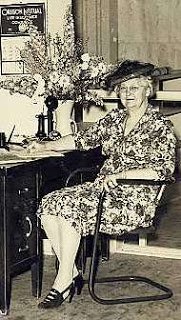In 1913, Winifred Pettyjohn found herself a 31 year-old widow with two young daughters to support, no money and considerable debts. She had a limited education and no marketable skills. The one asset she did possess was her home in Salem on 14th Street, NE. She raised the roof and added two apartments upstairs, then rented out the whole house. Her daughters were placed in the care of her parents and she enrolled at Capitol Business College “to see what she was ‘fit’ for”.
On completion of her course, she reclaimed her daughters and found a job as stenographer with the Oregon State Accident Commission. Sent by her employers to Newport, she discovered by chance a new direction for her life. She began helping a friend in his jewelry store on Sunday, the one day the soldiers stationed there had a day off, and found she had a flair for selling.
Her Lifeline
Returning to Salem in 1918, Winnie found that because many men were enlisting for war duty, she was able to enter the business world and secured a job with W. H. Grabenhorst Real Estate. With her first sales commissions, her was able to pay off the mortgage on her house and the last of her debts. At the conclusion of the war, and the return of the former employees, Winnie was replaced. She established her own real estate and insurance company in the Adolph Building in 1920. In the same year she taught herself to drive and bought her first automobile. Her business continued to be successful by injecting “the human element into real estate”.
In 1943, after nearly thirty year in real estate, Winnie closed her office, continuing in semi-retirement to operate her business from home. She was then able to devote more time to civic organizations in which she had already become active: Soroptimists, Community Concerts, the Cancer Society, the Woman’s Club and the Professional Woman’s Club.
Beginning in 1953, she also traveled, visiting the Holy Land, Egypt, Europe, South America and Africa. These extended trips allowed her learn about cultures different from our own and provided material for later travel seminars.
However, her interest and energy extended even further: in the 1960s, when she had passed her 80th year, Winnie formed a club for the study of parliamentary law, with meeting held at her 14th Street home. She also invested in a peach orchard and tulip farm.
A touching note from her elder daughter Helen on Mother’s Day, 1963 testifies to the continuing bond of affection with her daughters:
“For all the loving care you have lavished on me through out the years…for the fun we had as children… for the chance to learn…for the love of music in our home…for being mother and father through the years that must have been so difficult for you…I’m glad you decided to have me and I’m proud to be your daughter.”
In 1975, at age of 93, Winnie Pettyjohn died at her daughter’s West Salem home. Her funeral at Calvary Baptist Church was widely attended by the citizens of Salem. Her example of enterprise was an inspiration to them and to young women of today.

